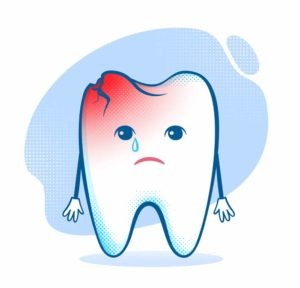
The symptoms of a broken tooth are sometimes difficult to distinguish from symptoms of other dental health issues. For instance, like bruxism or TMJ disorder, cracked tooth syndrome causes sensitivity to extreme temperatures. For example, eating ice cream, or drinking hot coffee may produce an aching sensation in your teeth. In severe cases, breathing hot or cold air may have the same effect. A broken natural tooth can also create toothache when chewing. Often with a crack, releasing chewing pressure feels more painful than applying pressure. Unfortunately, this symptom can also be confused with signs of an internally infected tooth (which would require a root canal).
As a Chicago dentist, Dr. Fondriest can take X-rays and perform other diagnostics to discover the cause of your symptoms. If you are experiencing dental pain or tenderness, schedule a consultation by calling 847-234-0517.
Symptoms of a broken tooth
Oftentimes, a broken tooth will exhibit a number of signs or symptoms. Some of the most common include:
- Temperature sensitivity (noticeable when eating foods that are extremely hot or cold)
- Tooth mobility
- Pain when biting down or chewing food
- Pus or discharge at the gum line
- Pain that waxes and wanes
In some instances, patients may not experience any pain or discomfort. That’s why it is so important to see your dentist for regular exams and cleanings. This allows your dental team to monitor your oral health and detect any issues early on.
Diagnosing a Broken Tooth
As mentioned earlier, some cracks can be fairly difficult to diagnose. However, there are a few common tests that can help indicate if this is the source of your discomfort:
- Bite test: You will be asked to bite down on a cotton roll, Q-tip, or other similar object. If pain presents, it is likely that your tooth is damaged.
- Transillumination: Hairline cracks are difficult to see. Shining a bright fiber optic light on the affected tooth can help reveal issues that are undetectable to the naked eye.
- Methylene blue dye: A blue dye can be applied to the tooth to highlight any hard-to-see fractures.
Can a Broken Tooth be Repaired?
Some fractures only affect a small portion of a tooth. A chipped tooth is easy to repair with bonding. If the fracture exposes the blood vessels, a root canal will be needed. However, there are some cracks that extend all the way down to the tip of the root. If this occurs, the tooth will likely need to be extracted. However, there are treatments available that can restore damaged teeth and help protect them from further damage. Cracks are best handled before they get worse.
What are some treatments for fractured teeth?
Treatment of a broken tooth depends on the location and severity of the crack. Minor chips or cracks can often be repaired by applying a white filling to the affected surface of the tooth. Minor cracks can also come from tooth decay. If it is a small cavity, then a simple filling will repair it. A broken cusp can be replaced with restorations such as a veneer or a porcelain fused to metal crown.
Cracks that have penetrated the pulp, or nerve center of the tooth require root canal treatment. Not all of these cracks can be successfully treated with this method. For cracks that extend to the tooth root, the remaining tooth cannot be saved with endodontic treatment and must be extracted. Vertical root fracture occurs when the crack starts from the root tip and extends toward the chewing surface. Sometimes endodontic surgery where the root tip is removed can provide adequate treatment for a vertical root fracture; however, in most instances, an extraction is necessary.
Timely Treatment is Essential
No one ever plans for a damaged tooth. There is a financial cost and a cost of inconvenience. As a result, we often have patients ask us how long they can wait before treating a broken tooth. Unfortunately, there is no way to know the answer to this question. While we can certainly cross our fingers with the hope the condition won’t worsen, there are simply no guarantees when dealing with a fractured tooth.
If you suspect something isn’t quite right, you should at least have the affected tooth examined by a dentist. Then, you will know which type of fracture you are dealing with, and you can anticipate the type of treatment that is necessary. If the condition goes untreated for long, it will likely worsen – sometimes to the point that an extraction is necessary.
How can I prevent broken teeth?
Preventing a broken tooth requires proactive measures against tooth injury. This involves assessing any current behaviors you may have developed and actively taking steps to modify them. For example:
- Avoid chewing on hard objects, such as hard candy, ice, or inedible objects, like pens or pencils.
- Prevent bruxism (teeth grinding) by wearing a nighttime mouthguard.
- Wear a mouthguard during any contact sports or other activities that commonly involve injury.
- If you suspect there is a problem, avoid chewing on that tooth until you can be seen by your dentist.
- Follow your dentist’s recommendations regarding treatment.
Keeping your teeth healthy is another great way to prevent fractures. Maintain a complete oral hygiene routine including visiting your Chicago dentist for bi-annual dental checkups and cleanings.
If you are experiencing the symptoms of chip or break, be sure to avoid a lost tooth. Early detection and treatment prevents further damage to your smile and possible avoids the need for extraction. To schedule an appointment at our Chicago dentist’s office, contact us at (847) 234-0517. Our practice mostly serves the Chicago metropolitan area including the North Shore and Northwest suburbs but we often get patients from all over the United States.
